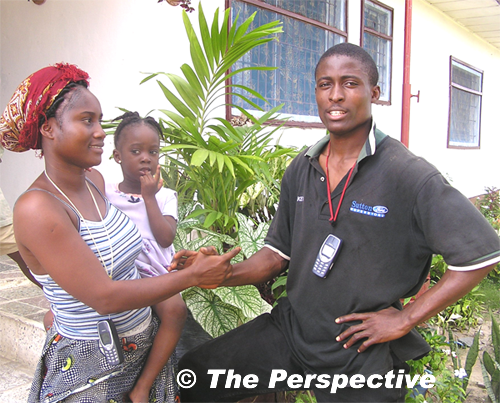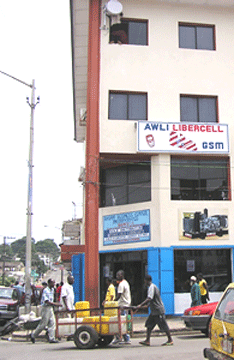
The End of Liberia's Cellular Phone Problem is in Sight!
By George H. Nubo
ghnubo@theperspective.org
The Perspective
Atlanta, Georgia
September 4, 2004
Before I left for Liberia in July, one of the first things I considered
was a cell phone. I made sure that I got a phone that could work in
the country – and I succeeded. I did not have to purchase a
new telephone because my wife’s old T-Mobile phone did the trick.
The first day after my arrival in Monrovia, I activated the phone
and bought a US$15.00 scratch card, assuming that that would solve
my communication problem. It didn’t. What it did efficiently
was to enable me to experience the problems that our brothers and
sisters have to go through on a daily basis. On our way back from
the Lone Star office in central Monrovia to Paynesville, we stopped
in Sinkor at a gas station opposite what used to be Relda, at which
time I decided to try my “new” phone. I attempted to call
a friend who works at the Elections Commission not knowing that the
Commission was just adjacent to my location. On the first attempt,
I was told that the phone was either switched off or the customer
was out of the coverage area.
 |
| It seems like everybody sports a cellphone in Monrovia - even cellphones that have been disconnected due to subscribers' inability to buy scratchcards. |
There is no consumer advocacy group. I began to wonder why everybody is complacent. Does it mean that Charles Taylor and the war launched by him have transformed Liberians into compliant subjects? Why nothing, be it public or private, works in the country nowadays? Is it a curse?
With these questions lingering on my mind, I left Liberia. On my way back, though very sick throughout the journey, I started to comfort myself by concluding that our best (I mean true patriots) will return to help rebuild this country. Names of engineers, accountants, professors, computer scientists, information technologists, and you name it, started popping up in my mind. Yes, our best minds could return, coupled with those already in the country could put an end to the problem of brain-drain in Liberia.
And not too long after my arrival in the US, I had the privilege to meet a group of Liberians that have a company that could answer some of my unanswered questions, i.e., solutions to Liberia’s telecommunication problems.
The company to which I am referring is: Liberia Wireless Corporation or LIWICO. LIWICO is a majority Liberian owned company. However, it is open to investors. I was told that during the initial stages of operation, LIWICO plans to focus on “Cellular Services in the 900 MHz range, using GSM technology” in Montserrado and nearby counties like Mount Gibi and Bassa, and will eventually expand its operation to other counties. In addition to Cellular Services, LIWICO intends to add Internet service provision to its menu.
Since competition promotes choice and quality services, LIWICO will be a competitor to Lone Star, a company many believe owned by Charles Taylor, his associates and their foreign partners. Based on the information I gathered while in Monrovia, Lone Star appears to have a monopoly over the cellular phone business in Liberia. One individual I spoke with said that during the Taylor administration, roadblocks were erected that made it very difficult for other companies to compete with Lone Star.
According to Mr. Eugene Bedell and Mr. Steve Olu Adams, part-owners of LIWICO, one of the company’s aims is to provide high quality GSM and American style customer service, which seems to be foreign to Liberians. It plans to provide employment opportunities for Liberian technicians residing in the US who are desirous to return home. It will also recruit and train Liberians on the ground to serve in their company. These gentlemen believe that their company will have an enormous impact on the Liberian economy. And based on their projection, LIWICO will pump millions of dollars into the Liberian economy annually.
After they provided me with all they were going to provide to the Liberian consumers, I then proceeded to find out the background of their management team. Find below brief backgrounds of the individuals that make up the partnership of LIWICO: James Elliott, MD, Mr. Eugene Bedell and Mr. Steve Olu Adams.


